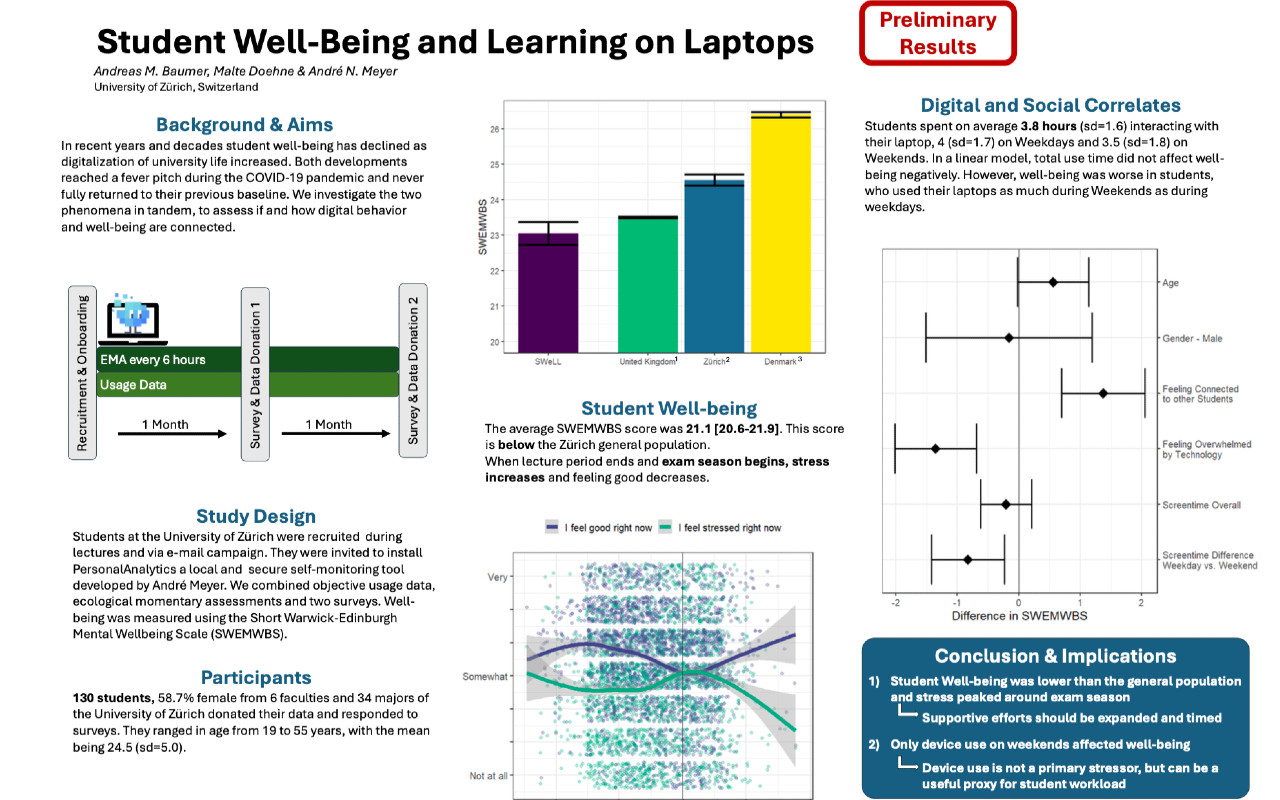SWeLL: Student Wellbeing and Learning on Laptops

21. October 2025
On Tuesday 2 December, André Meyer, Andreas Baumer and Malte Doehne will present the results of our 2025 communty project on how our UZH students use their laptops and how this relates to their mental wellbeing. We meet from 12:15-13:45 h in the DSI building in room Schrödinger (SOC-E-006).
Presentation Results Student Well-Being and Learning on Laptops (SWeLL)
Date: Tuesday, 2 December 2025
Time: 12:15-13:45
Location: DSI building in room Schrödinger (SOC-E-006).
Authors: Andreas M. Baumer, Malte Doehne & André N. Meyer, University of Zürich
Lunch will be provided.
The Student Well-Being and Learning on Laptops (SWeLL) study explores the relationship between digital behavior and well-being among 130 University of Zurich students. Using objective laptop usage data, surveys, and ecological momentary assessments, the study found that students spent an average of 3.8 hours per day on laptops. Overall screen time was not linked to poorer well-being, but students who used laptops equally on weekends and weekdays reported lower well-being. Average well-being scores were below the Zürich population, with stress peaking during exam periods. Findings suggest that weekend device use may reflect academic workload rather than cause stress directly.
This study uses the Digital Device Use Self-Monitoring Platform (part of the D2USP DSI Infrastructure) and we aim to continue further data collection until the end of 2025. These are preliminary results and a publication is pending.
Background & Aim
Student well-being and digital behavior have changed greatly over time, particularly since the COVID-19 pandemic. This study investigates how student’s laptop use is related to their well-being.
Participants
130 students from the University of Zürich (mean age 24.5, 58.7% female) across six faculties and 34 majors took part, donating data and completing surveys. Particpants covered a wide range of age’s, disciplines, and stations in their university career.
Methods
Participants installed PersonalAnalytics, a secure UZH-developed self-monitoring tool, and provided both objective usage data and well-being measures (short Warwick-Edinburgh Mental Well-Being Scale, SWEMWBS). Subjective data were collected through two surveys and ecological momentary assessments (EMAs).
Findings
- Students used their laptops for an average of 3.8 hours per day
- Average SWEMWBS well-being score: 21.1, lower than the Zurich general population
- Total screen time was not directly linked to poorer well-being.
- However, students who used laptops equally on weekends and weekdays reported lower well-being—suggesting reduced recovery time.
- Stress increased and well-being decreased during exam periods.
Conclusions & Implications:
- Student well-being was generally below the population average.
- Stress peaks around exams; therefore, support initiatives should be timed accordingly.
- Weekend device use may serve as a proxy indicator for academic workload, rather than a direct cause of stress.


